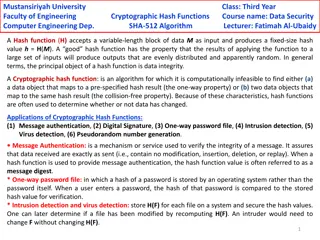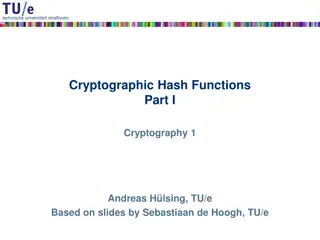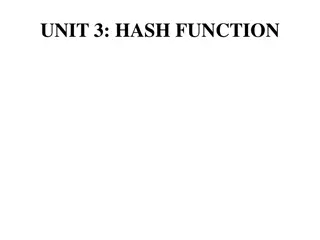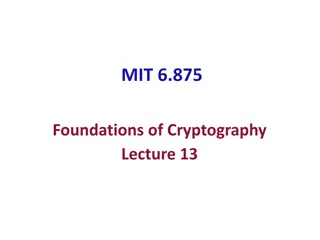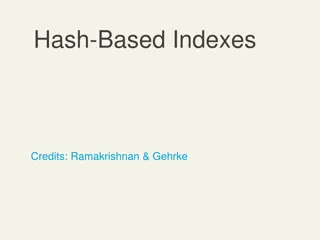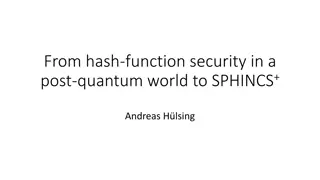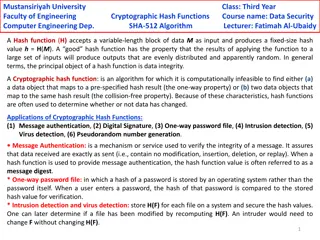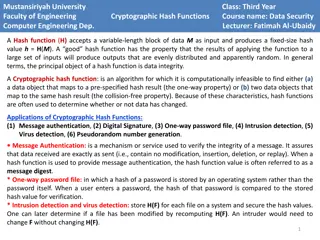Cryptographic Data Integrity Algorithms
Cryptographic data integrity algorithms ensure data integrity, verifying data received matches what was sent by authorized entities. Cryptographic hash functions play a crucial role in ensuring data integrity through hash values. Applications include message authentication, digital signatures, and v
7 views • 41 slides
Cryptographic Hash Functions in Data Security: Mustansiriyah University Course Overview
Cryptographic hash functions play a crucial role in ensuring data integrity and security. This course at Mustansiriyah University's Faculty of Engineering covers the SHA-512 algorithm and its applications in various fields such as message authentication, digital signatures, and intrusion detection.
2 views • 6 slides
Buy Playboy Hash Online - globaldrugsstore.com
Buy Playboy Hash Online is an Indica dominant hash that originated from Morocco where it is widely known to produce some of the best hash in the world. This hash is quite potent but very easy on the throat. It smokes incredibly smooth and has a sweet
3 views • 3 slides
Hash Joins and Symmetric Hash Joins in Database Queries
Hash joins and symmetric hash joins are key techniques used in database queries to efficiently access and combine data from multiple tables. Hash joins load candidate records into hash tables for quick probing, while symmetric hash joins maintain two hash tables with two hash functions. Despite thei
2 views • 8 slides
Cryptographic Hash Functions
Cryptographic hash functions play a crucial role in various aspects of security, including integrity protection, checksum generation, password hashing, digital signatures, and more. They are designed to efficiently convert input data of arbitrary length into fixed-length output, aiding in tasks like
3 views • 32 slides
Hash Functions in Data Structures
Hash functions are crucial in storing data efficiently by converting a sized amount of data into a single integer. They are used to generate hash values, hash codes, or hash sums, which serve as indexes in arrays. The hash function should be quick to compute and distribute hash addresses uniformly t
5 views • 200 slides
Cryptographic Algorithms and Hash Collisions Overview
Explore the world of cryptographic algorithms and hash collisions. Learn about various hashing algorithms like MD5, SHA-1, SHA-256, and more. Dive into the concepts of symmetric and asymmetric key algorithms and understand the risks associated with hash collisions. Discover the implications of post-
5 views • 58 slides
Foundations of Cryptography: Digital Signatures and Collision-Resistant Hash Functions
Foundations of Cryptography explores the construction of digital signature schemes and collision-resistant hash function families using one-way functions and safe primes. The content delves into the concept of collision-resistant hash functions and their construction from the discrete logarithm prob
7 views • 31 slides
Cryptographic Protocols and Key Exchange
This content delves into the world of cryptographic protocols, discussing the importance of security measures such as symmetric cryptography, hash functions, and public-key cryptography. It explores the field's various studies, goals, Diffie-Hellman key exchange, and the significance of key size in
5 views • 28 slides
Hash-Based Signatures
This comprehensive guide delves into the practical applications of hash-based signatures, exploring implementations with XMSS, AES, SHA-2, and other cryptographic algorithms. The content covers XMSS implementations in C, smartcard setups, PRF and hash functions from AES and SHA-2, as well as compari
2 views • 8 slides
Hash-Based Indexes
In this lecture, you will delve into hash-based indexes, exploring their application in database management. Topics covered include static and dynamic hashing techniques, review of hashing structures, adjustments against inserts and deletes, extendible hashing, linear hashing, and the relative stren
2 views • 8 slides
Bit Coins And Anonymity
Bitcoin provides a level of anonymity through its decentralized nature, allowing users to transact without the need for traditional banking methods. However, it does not offer complete anonymity. Cryptographic hash functions play a crucial role in securing Bitcoin transactions by ensuring data integ
0 views • 22 slides
Basic Cryptography
Cryptography is a mathematical method used to protect information in modern computing. This course covers cryptographic primitives such as hash functions, symmetric and asymmetric encryption, digital signatures, and their applications. Learn about the importance of cryptographic hash functions, usin
4 views • 19 slides
Secure Hashing, Digital Signatures, and Secret Sharing Principles
This presentation covers essential concepts of secure hashing, digital signatures, and secret sharing in information security. It discusses the motivation behind using hash functions, properties they must satisfy, examples like HMAC, and the importance of cryptographic hash functions. The content ex
3 views • 46 slides
Hash Tables
Hash tables are essential data structures that support efficient operations like insertion, search, and deletion. They find applications in symbol tables of compilers, routing tables for network communication, and more. To minimize collisions, choosing the right hash function is crucial. When collis
2 views • 39 slides
Hash Tables: Ideal Data Structure for Efficient Key-Value Retrieval
Hash tables are a fundamental data structure used to fetch key-value pairs efficiently. They involve a hash function to compute an index for storing and retrieving values. Collisions can occur when multiple keys map to the same index. Understanding hash functions and collision handling strategies li
4 views • 20 slides
Cryptography Lecture 7: Quick Recall, Hash Functions, and Applications
In this lecture, Arpita Patra covers important topics such as CCA-security definitions, construction based on secure SKE and MAC, hash functions, domain extension, key agreement, and assumptions in finite cyclic groups. The discussion delves into the properties of good cryptographic hash functions,
0 views • 20 slides
Cryptographic Signatures: Hash, RSA, and ECDSA Explained
In this content, the concepts of cryptographic signatures are explored, covering topics such as the hash and sign paradigm, the vulnerabilities of plain RSA signatures, RSA-FDH, and ECDSA (used in Bitcoin). The content delves into signature schemes, security definitions, threat models, and formal de
2 views • 38 slides
Hash Functions in Data Structures
Hashing is a crucial concept in data structures where hash functions play a key role in mapping keys to values efficiently. This chapter delves into the importance of perfect hash functions, the total number of possible hash functions, and methods like division and folding to ensure valid indexing.
3 views • 32 slides
Cryptographic Hashing
Cryptographic hashing is a key concept in data security, ensuring data integrity and authenticity. Learn about the properties of good cryptographic hashes, the difference between encryption and hashing, and delve into the specifics of SHA-1, its collisions, and processing of original messages. Under
0 views • 39 slides
Cryptographic Hash Functions and Applications
This collection of images and text introduces topics such as pseudorandom permutations, MACs, hash functions, and cryptographic hash function applications. It covers concepts like the pigeonhole principle, hash collisions, collision-resistant hash functions, and keyed hash functions. The content del
1 views • 20 slides
Post-Quantum Security and Cryptographic Hash Functions
Explore the transition to post-quantum security with a focus on cryptographic hash functions like SPHINCS+, covering collision resistance, second-preimage resistance, preimage resistance, and more. Understand the concepts behind classical and post-quantum security, including adversary capabilities i
1 views • 48 slides
Hash Tables and Hash Functions
Learn about hash tables, hash functions, collision resolution techniques like separate chaining, and how to choose the right hash function for optimal performance. Discover key concepts and methods in hashing including direct access tables, dynamic hashing/rehashing, load factors, and more.
5 views • 22 slides
Cryptographic Hash Functions and Properties
Learn about cryptographic hash functions, hash properties, collisions, and their applications in cryptocurrencies. Explore how hash functions ensure collision-free and hiding properties for secure data handling.
3 views • 50 slides
Data Security and Cryptographic Hash Functions at Mustansiriyah University
Explore the world of cryptographic hash functions at Mustansiriyah University's Faculty of Engineering. Learn about the SHA-512 Algorithm, security requirements, applications, and attacks on hash functions. Discover the importance of data integrity and the role of hash functions in message authentic
0 views • 4 slides
Cryptographic Hash Functions in Data Security Engineering
Understand the significance of cryptographic hash functions in ensuring data integrity and security. Delve into the applications, properties, and requirements of hash functions along with potential attacks. Join the course at Mustansiriyah University to explore the realm of data security in computer
0 views • 9 slides
Cryptographic Hash Functions and Blockchain Technology
Delve into the realm of cryptographic hash functions, blockchain technology, digital signatures, and more. Explore the concepts of centralization versus decentralization, hash accumulators, Merkle trees, and the significance of hash pointers in data structures like blockchain.
3 views • 18 slides
Idealized Model for Cryptographic Primitives and Indifferentiability Framework
Explore new notions and constructions in public key crypto-systems, leakage resilience, related-key attack PKE, and idealized models for cryptographic primitives such as hash functions, random oracles, and more. Learn about the concept of Ideal NIKE and the Indifferentiability Framework in the conte
6 views • 20 slides
Hash Tables for Efficient Data Retrieval
Learn about hash tables and how they are used to efficiently retrieve data based on keys. Discover the implementation of dictionaries/maps, the role of hash functions, and the advantages of hash tables over other data structures. Dive into the concepts behind balanced BSTs and explore the potential
0 views • 10 slides
Cryptographic Hash Functions and Their Properties
Explore the world of cryptographic hash functions, which map data to fixed-size bit arrays, and learn about their deterministic nature, diffusion property, and collision challenges. Discover how these functions differ from encryption and their essential role in data security.
2 views • 21 slides
Introduction to Hash Tables in Data Structures
A hash table is an abstract data type that facilitates operations like insert, search, and delete in constant average time. Hash functions are utilized to map keys to slots in a hash table, aiming for even key distribution to avoid collisions. Learn the principles behind hash functions, collisions,
3 views • 30 slides
Hash Tables: Abstract Data Type Supporting Operations
Hash tables are an abstract data type that enables efficient insert, search, and delete operations in constant average time. To achieve this, a hash function maps keys to array slots in the table. Collisions, when distinct keys map to the same slot, must be managed effectively. Making choices on tab
2 views • 27 slides
Mitigating Multi-Target Attacks in Hash-Based Signatures
Explore research on mitigating multi-target attacks in hash-based signatures, including trapdoor identification schemes, hash-based signature schemes, and intractability assumptions in cryptographic hash functions. Gain insights into Merkle's hash-based signatures and minimizing security assumptions
0 views • 56 slides
Understanding Post-Quantum Signatures and Hash-Based Schemes
Explore the intricacies of post-quantum signatures, lattice-based schemes, and hash functions in a post-quantum computing world. Delve into topics like collision resistance, second-preimage resistance, and pseudorandomness for enhanced understanding and security. Discover the vulnerabilities and str
3 views • 51 slides
Understanding Cryptographic Hash Functions and Their Applications
Learn about cryptographic hash functions, including how they are used for integrity protection, checksums, password hashing, MACs, digital signatures, and more. Explore the properties like collision resistance and preimage resistance that define their security.
0 views • 22 slides
Understanding Cryptographic Hashing and SHA Algorithms
Explore the concepts of cryptographic hashing, the properties of good cryptographic hashes, and the significance of SHA (Secure Hash Algorithm) in ensuring data integrity and security. Learn about the distinction between encryption and hashing, the practical applications of cryptographic hashing, an
1 views • 38 slides
Understanding Hash Tables and Functions
Explore the concepts of hash tables, hash functions, and collisions in data structures and algorithms. Learn how hash tables operate, the importance of hash functions, and how collisions are managed. Discover the key considerations when implementing a hash table for efficient data storage and retrie
3 views • 30 slides
Hashing and Sorting Techniques in Data Structures
Explore the concepts of hashing, sorting, and cryptographic hash functions in data structures. Understand the implementation of hash tables, analyzing performance metrics, and the mathematical principles behind the distribution of items in hash buckets. Delve into the complexities of cryptographic h
1 views • 41 slides
Understanding Hashing and Hash Tables
This content provides detailed information about hashing, hash tables, and hash functions in computer science. Learn how data can be organized efficiently using these concepts to perform operations in constant time. Discover the basics of hashing, the role of hash functions in generating hash values
0 views • 48 slides
Cryptographic Hash Functions in Data Security Engineering
Dive into the world of cryptographic hash functions at Mustansiriyah University, exploring the fundamental concepts, applications, security requirements, and potential attacks in data security engineering.
0 views • 4 slides

